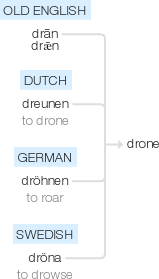Drone
Old English drān, drǣn ‘male bee’, from a West Germanic verb meaning ‘resound, boom’; related to Dutch dreunen ‘to drone’, German dröhnen ‘to roar’, and Swedish dröna ‘to drowse’.
wiktionary
From Middle English drane, from Old English drān, from Proto-West Germanic *drānu, from Proto-Germanic *drēniz, *drēnuz, *drenô(“an insect, drone”), from Proto-Indo-European *dʰrēn-(“bee, drone, hornet”).
Cognate with:
From Middle English drounen(“to roar, bellow”), from Proto-West Germanic *drunnjan, from Proto-Germanic *drunjaną(“to drone, roar, make a sound”), from Proto-Indo-European *dʰer-(“to roar, hum, drone”).
Cognate with Scots drune(“to drone, moan, complain”), Dutch dreunen(“to drone, boom, thud”), Low German drönen(“to drone, buzz, hum”), German dröhnen(“to roar, boom, rumble”), Danish drøne(“to roar, boom, peel out”), Swedish dröna(“to low, bellow, roar”), Icelandic drynja(“to roar”).
etymonline
drone (n.)
Middle English drane, drone, "male honeybee," from Old English dran, dræn, from Proto-Germanic *dran- (source also of Middle Dutch drane; Old High German treno; German Drohne, which is from Middle Low German drone), probably imitative (compare Lithuanian tranni, Greek thronax "a drone"). Given a figurative sense of "idler, lazy worker" (male bees make no honey) 1520s. Meaning "pilotless aircraft directed by remote control" is from 1946.
Drones, as the radio-controlled craft are called, have many potentialities, civilian and military. Some day huge mother ships may guide fleets of long-distance, cargo-carrying airplanes across continents and oceans. Long-range drones armed with atomic bombs could be flown by accompanying mother ships to their targets and in for perfect hits. [Popular Science, November 1946]
Meaning "a deep, continuous humming sound" is from c. 1500, apparently an independent imitative formation (compare threnody). Meaning "bass pipe of a bagpipe" is from 1590s.
drone (v.)
mid-14c., drounen, "to roar, bellow;" c. 1500, "to give forth a monotonous and unvaried tone, hum, or buzz," imitative (see drone (n.)). In modern times it often is the characteristic sound of airplane engines. Meaning "speak in a dull, monotonous tone" is from 1610s. Related: Droned; droning.
